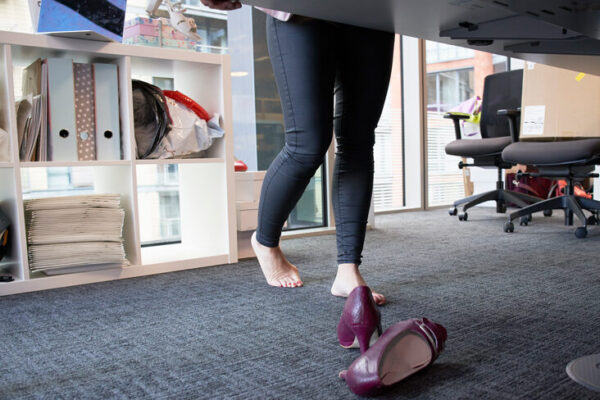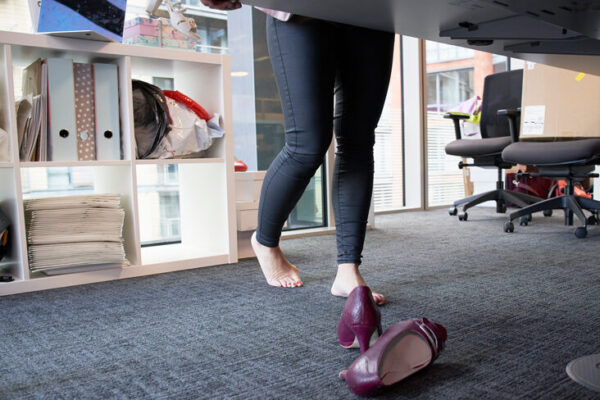As we age, our feet change, and our shoes need to change as well. As seniors, we need a good pair of shoes that will provide the support, stability, and comfort needed to keep us active. Finding the right pair of Walking Shoes for Elderly can be a daunting task, but it doesn’t have to be. In this blog post, we’ll discuss how to select the best shoes for seniors to ensure they remain comfortable and safe on their feet. We’ll also talk about the importance of getting fitted properly and the features you should look for when shopping for the perfect pair of walking shoes.
Why Seniors Need Proper Walking Shoes for Elderly Woman?
As we age, our feet become more vulnerable to various conditions, such as arthritis, bunions, and plantar fasciitis. These issues can make walking painful and difficult, which is why choosing the right Walking Shoes for Elderly Woman is essential.
The feet of older adults may also be less sensitive to pressure, which increases the risk of developing blisters, calluses, and corns. Properly fitting walking shoes for seniors can reduce the likelihood of these problems.
Moreover, seniors who experience balance or mobility issues require shoes that provide proper support, stability, and traction. Falls are a significant risk for the elderly, and wearing the wrong footwear can increase the risk of slips and falls.
Choosing the right Walking Shoes for the Elderly women can make all the difference in their quality of life and independence. They need shoes that are comfortable, supportive, and safe to wear. In the next section, we’ll discuss the key characteristics of the right Walking Shoes for the Elderly.
Characteristics of the Right Walking Shoes for the Elderly
When it comes to finding the right Walking Shoes for the Elderly individuals, there are certain characteristics you should be looking for. The shoes should provide ample support and cushioning, and be lightweight and flexible. Here are some key characteristics to keep in mind:
- Support and Cushioning: As we age, our feet may require additional support and cushioning. Look for shoes that have sturdy arch support and shock-absorbing materials in the midsole. It can help reduce the risk of injuries and foot pain.
- Proper Fit: Shoes that fit properly are essential for elderly individuals. Make sure there is enough room in the toe box, but not so much that your foot slides around. The heel should fit snugly but not be too tight.
- Lightweight and Flexible: Heavy shoes can be difficult to walk in and may cause unnecessary fatigue. Look for shoes that are lightweight and flexible to allow for natural foot movement.
- Slip-Resistant Soles: Falls are a common concern for seniors, so slip-resistant soles are essential. Look for shoes that have a rubber outsole with a pattern that provides good traction on both wet and dry surfaces.
- Easy to Put On and Take Off: Elderly individuals may have difficulty bending over or reaching their feet, so shoes that are easy to put on and take off are a plus. Look for shoes with Velcro closures or elastic laces.
 Importance of Arch Support and Cushioning
Importance of Arch Support and Cushioning
As we age, our feet undergo several changes that require more attention when choosing the right Walking Shoes for the Elderly individuals. One essential factor to consider is arch support and cushioning.
The arch of the foot plays a crucial role in supporting the body’s weight during movement. For elderly individuals, the arch may start to flatten or lose support, leading to conditions such as plantar fasciitis or heel spurs. Proper arch support in walking shoes can alleviate these issues and reduce the risk of further damage.
Cushioning is also important, especially for elderly individuals who may have decreased natural cushioning in their feet. A well-cushioned shoe helps to absorb the shock from each step, reducing impact on the joints and decreasing the risk of injuries.
When selecting Walking Shoes for the Elderly individuals, consider shoes with added cushioning in the soles and support around the arch area. A shoe with removable insoles is ideal as they can be replaced with customized inserts that cater to the specific needs of the individual’s feet.
Overall, it is crucial to choose Walking Shoes for the Elderly individuals with proper arch support and cushioning. Doing so can alleviate discomfort, reduce the risk of injuries, and promote a comfortable and enjoyable walking experience.
Factors to Consider When Choosing Walking Shoes for the Elderly
When choosing the best Walking Shoes for the Elderly individuals, there are a few factors to consider to ensure optimal comfort, support, and safety. Here are some key factors to keep in mind:
- Comfort: Seniors often experience foot pain and discomfort, so finding shoes that offer a comfortable fit is crucial. Look for shoes that have a cushioned insole, breathable upper material, and a padded collar to prevent rubbing.
- Arch Support: Many seniors have flat feet or high arches, which can lead to discomfort and pain while walking. Look for shoes that have arch support built into the insole, or consider purchasing orthotic inserts for added support.
- Sole Traction: Walking Shoes for the Elderly individuals should have a non-slip sole to prevent slips and falls. Look for shoes that have a textured or rubber sole for added traction.
- Fit: The right fit is essential for walking shoes. Consider measuring the senior’s feet before purchasing shoes, and be sure to choose shoes that have a secure, snug fit without being too tight.
- Breathability: Elderly feet tend to sweat more, so choosing shoes that allow for breathability is important. Look for shoes that have a mesh or breathable upper material to allow for proper ventilation.
Tips on Finding the Perfect Fit for Elderly Feet
Finding the right pair of walking shoes can be tricky, especially when it comes to elderly feet. As we age, our feet may experience changes in size, shape, and structure. Therefore, it’s important to take these factors into consideration when selecting a pair of Walking Shoes for the Elderly individuals. Here are some tips to help you find the perfect fit:
- Get measured: Have your feet measured by a professional, especially if it’s been a while since you last had them measured. This will help you determine the size and width of your feet.
- Try on shoes in the afternoon: Our feet tend to swell throughout the day, so it’s best to try on shoes in the afternoon when they are at their largest.
- Wear socks: Always wear the same type of socks you plan on wearing with your walking shoes when trying them on.
- Walk around: Don’t just stand still in the shoes, walk around the store and see how they feel. You should be able to wiggle your toes and feel some cushioning and support.
- Consider the type of closure: Some walking shoes have laces, others have Velcro or slip-on designs. Choose the closure type that works best for the individual’s needs and abilities.
- Check for flexibility: The shoes should be flexible and move with the foot. Try bending and twisting the shoe to see how it moves.
- Avoid shoes with a high heel: High heels can put additional strain on the feet and increase the risk of falls.
Lightweight and Flexible Designs
As we age, our feet become more delicate, making it necessary to choose lightweight and flexible walking shoes. Seniors who walk regularly need a pair of shoes that can support their feet and provide them with stability and balance. Shoes that are too heavy or stiff can cause discomfort, fatigue, and even pain.
When shopping for walking shoes, look for designs that are lightweight and have a flexible sole. It allows your feet to move more naturally and easily. Avoid shoes with thick soles or heavy materials that can weigh down your feet and increase the risk of tripping or falling.
One option to consider is mesh or knit uppers that allow your feet to breathe while providing a comfortable fit. These types of materials are often used in running shoes and are designed to be flexible, supportive, and lightweight.
Another factor to consider is the overall weight of the shoe. You want a pair that doesn’t feel cumbersome, especially if you plan on wearing them for extended periods. Many shoe manufacturers offer lightweight options that don’t skimp on support or cushioning.
When you try on a pair of walking shoes, make sure to walk around the store to test the flexibility of the sole. A good walking shoe should be easy to flex and bend in the forefoot area. It’s also a good idea to choose shoes with a moderate amount of cushioning, especially if you have flat feet or plantar fasciitis.
In summary, seniors need lightweight and flexible walking shoes that provide the right support, comfort, and stability for their feet. Consider trying out various options to find the perfect fit and remember to prioritize features that meet your unique needs and preferences.
How to Break in New Best Shoes For Balance Elderly?
Buying a new pair of the Best Shoes For Balance Elderly is only the first step to ensuring comfort and safety while walking, especially for elderly individuals. Properly breaking in new shoes is just as important, as it helps to prevent foot pain and blisters.
To start, wear the new shoes around the house for a few hours each day to gradually get used to them. Walking on different surfaces can also help to loosen up the shoe materials. Another trick is to use a hair dryer to warm up the shoes and then wear them with thick socks to stretch them out. It is important not to wear the shoes for extended periods of time or engage in long walks until they are fully broken in.
When breaking in new shoes for elderly individuals, it is also important to pay attention to any discomfort or pain. If there is any discomfort or pain, remove the shoes immediately and let the feet rest. Only wear the shoes for longer periods of time when they are comfortable and pain-free.
Properly breaking in new shoes is a crucial step in ensuring comfort and safety while walking. With these tips, elderly individuals can enjoy the benefits of their new walking shoes while keeping their feet happy and healthy.
Conclusion
It’s essential to recognize the importance of choosing the right Walking Shoes for the Elderly individuals. Proper footwear can prevent discomfort, pain, and even injury. The characteristics of a good walking shoe include arch support, cushioning, and a lightweight and flexible design.
| Other Good Articles to Read |
| Niche Blogs Connect |
| Blogs 97 |
| Blog Stitution |
| Blogs Unplugged |
| Blogs Cotch Rouge |
| Blog Signatr |
| Blog Sintonias |
| Blog Zilla |
| Consumer Forums |
| Finance Forums |
| G Blogs |
| Too Blog |



